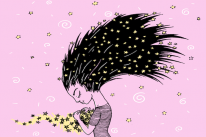
“You yourself, as much as anybody in the entire universe, deserve your love and affection.” ~Buddha
In 2012, self-love became the most important thing in my life. After self-loathing and addiction led me to rock bottom, there was nowhere to go but up. When someone asked me last year how long I’d been on the self-love journey, I counted back from 2012. That’s when I thought it began.
In my old journals, however, I recently found something strange and incredible—my self-love journey started long before I thought it had. Years prior to hitting rock bottom, I’d been having the same epiphanies: I need to love myself, I need to stop trying to get other people to love me, I need to be kinder to myself.
Yet those epiphanies wouldn’t last. In fact, I habitually forgot about them as I returned to my “normal” back then—anxiety, depression, self-judgment, social anxiety, and a host of addictive behaviors that helped me escape these uncomfortable states.
Strangely enough, when my suffering was at its worst, few people could have said that self-love was the problem. I had an outward facade of ironclad self-confidence. Most people thought I loved myself too much.
Yet my journals tell another story. It is a story of not only silent suffering but also accidentally ignoring all my attempts to heal that suffering. Even though I was chronically self-sabotaging, I was also trying to help myself along the way.
In a Facebook comment to one of my other posts on Tiny Buddha, someone wrote, “A lot of truth in this, but I’m so tired of the thing about loving yourself. Nobody has ever written about how this happens when you don’t feel that way. It sounds so simplistic—just love yourself first. Great, still no answers!!”
It might be ironic to give an even more simplistic answer to this, such as “Find the answers within you.” But I think it’s important to note that there is a difference between simplicity and ease. The most important lessons in life really are simple—love yourself, find your own answers, know yourself. Yet implementing these lessons is a lifetime job full of tears, fears, and uncertainty.
The truth is—the answers are within you, just like they were within me. It’s just a matter of discovering them and implementing them consistently.
Your answers are within your experience. But they aren’t filed into neat folders. They’re scattered in every moment between alarm clocks, worries, and errands. They’re also not labelled by which questions they answer. You might get a bad feeling about something and that could be self-love, but it could also be fear.
So, instead of answers, I’d like to provide some questions. Your relationship with yourself is unique and your answers will be unique. And the answers will keep changing. You can ask these questions every day, and that wouldn’t be too much.
1. How can I better understand this experience?
One sentence that I found frequently written in my old journals was, “Why does this always happen to me?” I said this about periods of depression as much as relationship patterns.
When I asked this question, I wasn’t looking for an answer. My biggest mental health breakthrough was learning to genuinely ask that question. No, really, why do I always end up alone when I most need people? Why do I sometimes experience overwhelming periods of depression? Thus, I started to learn important things about myself.
I learned that I had a tendency to never take breaks, strive for perfection, and burn myself into the ground. I also learned that I had a way of pushing people away to “test” if they’d stick around. Seeing these patterns was painful, but much less painful than believing I was broken, unworthy, and doomed to being alone.
When you’re in the middle of criticizing or judging yourself, take a moment to shift your focus toward understanding.
Instead of trying to fix your emotions or your reactions, how can you understand them better? What are your feelings trying to communicate to you? How can you acknowledge these messages?
Instead of beating yourself up for saying or doing something, how can you get a more holistic perspective on your motivations for saying/doing this thing?
When you make a conscious decision to be more curious about your experience, you will naturally stop resisting, judging, and criticizing it. The more you embrace each moment, the more you will be able to embrace yourself.
2. Who am I beyond my behaviors, thoughts, and emotions?
To be able to embrace the ups and downs of life without losing self-love, you must love yourself beyond those ups and downs. This is the difference between self-approval and self-love.
Approval comes and goes. When you make a mistake, you might disapprove of yourself. This is healthy and normal. If you didn’t experience lulls in self-esteem, you might never learn from your mistakes and end up hurting others.
Self-love, on the other hand, is something you need in each moment—especially when your self-esteem is low.
When you don’t approve of your behaviors, ask yourself who you are beyond those behaviors. How can you accept yourself beyond the rollercoaster of day-to-day experience, so that no matter what those experiences are, you continue to think of yourself as worthy of existing?
3. What do I need right now?
Each day, ask yourself what you need. Like this, you can begin to nourish yourself. You can also begin to understand some of the side effects that you experience when you don’t meet your needs. Once you feed your hunger, you’ll better understand your symptoms of starvation. This can lead to profound self-forgiveness.
Especially when you are trying to break bad habits, you can ask which needs you’re trying to meet with those habits.
Every single self-harming action, even if it hurts you deeply, also serves you in some way. Maybe your unhealthy habits make you feel comfort, control, or even help you gain attention. The need behind each behavior is always valid, but some behaviors are more sustainable and healthy than others. By acknowledging your deeper needs, you can make a plan to consciously meet them in a healthier way.
One thing I’ve discovered that I need is movement. I have so much energy in my body from day to day. I didn’t realize this for a long time because I expended that energy on chronic anxiety.
When I realized that I could use my energy to be physically active, my life changed. My anxiety levels plummeted. I formulated a completely different relationship with my body. I also got a new perspective on my long struggle with eating disorders, smoking, and addiction.
I had a basic need to control my body, to influence my physical state. I still have that need. The only difference is that, now, I’m making conscious choices about how I’m going to meet it.
4. How can I give myself what I need?
Once you discover what your needs are, you can begin to anticipate them and fulfill them.
Simply to acknowledge your desires is half the work (especially if they are different from those of the people around you).
The other half of the work is asking yourself, every day, how you can meet your needs. The key is to foresee your hunger and feed it before you feel starved. This way, you can avoid relapsing into those desperate self-destructive habits.
5. How can I acknowledge the needs that I can’t yet meet?
Let’s say you discover that you need more alone time than you thought. And suppose you discover this while living with four roommates. Chances are, you will not be able to meet this need overnight. However, self-love isn’t a report card on how quickly you’ve fixed your problems. It’s simply the practice of having a kinder relationship with yourself.
You can acknowledge your frustration and your desires before taking action to address them. You can comfort yourself and assure yourself that you are going to do something about it. Remember how you’ve felt better when other people have reassured you. How can you give that kind of reassurance to yourself?
6. How can I take responsibility for myself?
One thing that might interrupt your journey of self-nourishing is waiting for someone or something else to save you.
You might acknowledge your need for appreciation, but instead of taking action to meet it, you might tell yourself a story about when it will come.
You might tell yourself to wait until some promotion, accomplishment, or event. Thus, you can lose out on valuable opportunities to love yourself.
Start to pay attention to which needs you aren’t meeting because you’re putting them into the future or into other people’s hands. And ask yourself how you can begin to meet that need right now by yourself.
—
We all long to have someone be attentive to us—to really care about what we’re going through and how to make it better.
The most beautiful part of learning to ask and answer these questions on a regular basis is this: your longing will finally be fulfilled.
You do not need to wait for someone to make you feel like you are worth listening to and caring for. Your savior has been waiting in the mirror all along.
About Vironika Tugaleva
Vironika Tugaleva (also known as Vironika Wilde) is a poet, spoken word artist, activist, and award-winning author. Vironika believes in the medicinal power of honest words and tough truths. When Vironika isn't writing, she loves stargazing, singing, and eating pickles (sometimes, all at once). You’re welcome to follow her on Instagram (@vironikawilde), check out her latest book, Love & Gaslight, or get a free preview of The Art of Talking to Yourself.
- Web |
- More Posts













 Though I run this site, it is not mine. It's ours. It's not about me. It's about us. Your stories and your wisdom are just as meaningful as mine.
Though I run this site, it is not mine. It's ours. It's not about me. It's about us. Your stories and your wisdom are just as meaningful as mine. 